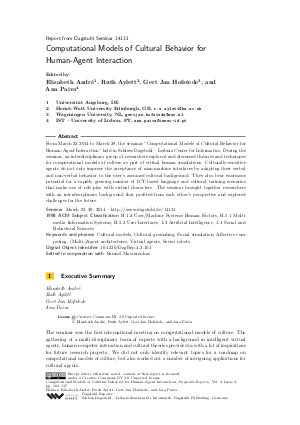Computational Models of Cultural Behavior for Human-Agent Interaction (Dagstuhl Seminar 14131)
Authors Elisabeth André, Ruth Aylett, Gert Jan Hofstede, Ana Paiva and all authors of the abstracts in this report
-
Part of:
Issue:
Dagstuhl Reports, Volume 4, Issue 3
Part of: Volume: Dagstuhl Reports, Volume 4
Part of: Journal: Dagstuhl Reports (DagRep) - License:
 Creative Commons Attribution 3.0 Unported license
Creative Commons Attribution 3.0 Unported license
- Publication Date: 2014-07-03
File

PDF
DagRep.4.3.103.pdf
- Filesize: 1.58 MB
- 35 pages
Document Identifiers
Subject Classification
Keywords
- Cultural models
- Cultural grounding
- Social simulation
- Affective computing
- (Multi-)Agent architectures
- Virtual agents
- Social robots
Metrics
- Access Statistics
-
Total Accesses (updated on a weekly basis)
0PDF Downloads0Metadata Views
Abstract
From March 23 2014 to March 28, the seminar "Computational Models of Cultural Behavior for Human-Agent Interaction" held in Schloss Dagstuhl -- Leibniz Center for Informatics. During the seminar, an interdisciplinary group of researchers explored and discussed theories and techniques for computational models of culture as part of virtual human simulations. Culturally-sensitive agents do not only improve the acceptance of man-machine interfaces by adapting their verbal and non-verbal behavior to the user's assumed cultural background. They also bear enormous potential for a rapidly growing number of ICT-based language and cultural training scenarios that make use of role-play with virtual characters. The seminar brought together researchers with an interdisciplinary background that profited from each other's perspective and explored challenges for the future.
Cite As Get BibTex
Elisabeth André, Ruth Aylett, Gert Jan Hofstede, and Ana Paiva. Computational Models of Cultural Behavior for Human-Agent Interaction (Dagstuhl Seminar 14131). In Dagstuhl Reports, Volume 4, Issue 3, pp. 103-137, Schloss Dagstuhl – Leibniz-Zentrum für Informatik (2014)
https://doi.org/10.4230/DagRep.4.3.103
BibTex
@Article{andre_et_al:DagRep.4.3.103,
author = {Andr\'{e}, Elisabeth and Aylett, Ruth and Hofstede, Gert Jan and Paiva, Ana},
title = {{Computational Models of Cultural Behavior for Human-Agent Interaction (Dagstuhl Seminar 14131)}},
pages = {103--137},
journal = {Dagstuhl Reports},
ISSN = {2192-5283},
year = {2014},
volume = {4},
number = {3},
editor = {Andr\'{e}, Elisabeth and Aylett, Ruth and Hofstede, Gert Jan and Paiva, Ana},
publisher = {Schloss Dagstuhl -- Leibniz-Zentrum f{\"u}r Informatik},
address = {Dagstuhl, Germany},
URL = {https://drops.dagstuhl.de/entities/document/10.4230/DagRep.4.3.103},
URN = {urn:nbn:de:0030-drops-45945},
doi = {10.4230/DagRep.4.3.103},
annote = {Keywords: Cultural models, Cultural grounding, Social simulation, Affective computing, (Multi-)Agent architectures, Virtual agents, Social robots}
}
